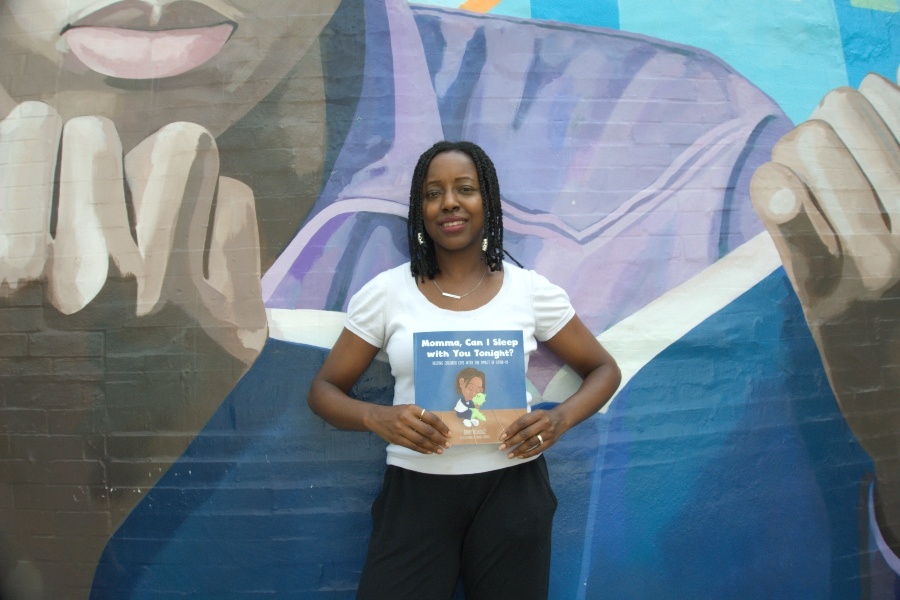
West Philly counselor and grief expert Jenny Delacruz talks about her new book, Momma, Can I Sleep with You Tonight?

West Philly therapist Jenny Delacruz just released her new children’s book, Momma, Can I Sleep with You Tonight? Helping Children Cope with the Impact of COVID-19. / Photograph courtesy of Jenny Delacruz.
For many people, the coronavirus pandemic has dredged up feelings of fear, sadness, and anger. As the crisis continues, parents and guardians might be wondering how to best comfort their children, who are also trying to cope with this “new normal.”
In her new book, Momma, Can I Sleep with You Tonight?: Helping Children Cope with the Impact of COVID-19, West Philly counselor Jenny Delacruz depicts a mother and young son navigating the five stages of grief — denial, anger, bargaining, depression, and acceptance — in the age of coronavirus. In addressing concerns like “My whole life feels like a bad dream” and “I don’t want Nana to get sick” with empathy, reassurance, and logical thinking, Delacruz strives to help parents and children process their emotions together. We chatted with Delacruz about writing a children’s book about coronavirus, plus ways parents can best support their kids right now.
Be Well Philly: Who or what inspired you to write this book?
Delacruz: My younger son, who is four years old, was the catalyst for Momma, Can I Sleep with You Tonight?. On April 5th, he woke me up at 4 a.m. to talk about his real fears surrounding COVID-19 and the struggles of social distancing. We talked for a little while before he finally fell asleep. After our conversation, I picked up my phone and started writing about what I observed during my own interaction with him, as well as what I had been hearing from folks in my community. I just had this strong creative surge that needed to be released. It’s amazing to say, but by 6 a.m., the first draft was finished.
You’ve previously published a children’s book, but why choose this genre to address a global pandemic?
Primarily, I write children’s books because I’m a mother of two sons, ages six and four. I see firsthand how things affect them, and want to discuss issues and their reactions in ways that adequately prepare them for reality. Both of my books age-appropriately touch on real-world topics like grief and racism — subject matter that is often saved for adult conversations. But when the focus is on protecting children’s innocence and keeping them “safe,” a sense of distrust can result, especially when children discover the world isn’t how adults made it out to be. I believe children should be supported during their learning [of hard topics] so that they gain a stronger sense of reality, hone their critical thinking skills and emotional intelligence, and become agents of change.
In addition to coronavirus, what other issues does Momma, Can I Sleep with You Tonight? help parents and children navigate?
In the story, the mother tries to comfort her son by talking through the five stages of grief, which makes the book more than just a story, and more of a resource for children and parents alike. It helps articulate children’s feelings — my own kids said, “I felt frustrated just like in the book because I miss hanging with my friends and going to my favorite ice cream shop” — and validates adults’ emotions, too. Plus, the end of the book features free resources for grief counseling and at-home activities, so parents can help their kids — and themselves — deal with any kind of trauma, not just ones related to COVID-19.
View this post on Instagram
A post shared by Jenny | storytimewithmsmelange (@storytimemelange) on
How else can parents and guardians support children during emotionally-charged times?
The biggest piece I can give to anyone caring for a child, though, is that if you or your child needs professional support, it’s okay to get it. Not only do we need to break the stigma surrounding mental health, but we need radical self-care in these radical times — something I learned from the organization, GirlTrek.
As for specific actions folks can take daily: First, utilize art and play to help kids express themselves. Children don’t always have the linguistic toolbox to verbalize their emotions, but they are able to communicate in other ways. Playtime or art time is a great chance for you to check in with them and ask them how they’re feeling. Second, validate and empathize with their feelings. When a child tells you they’re feeling angry or sad, say, “I’ve been angry and sad, too.” Their and our emotions are valid, and we have to allow each other to feel, accept, and embrace whatever it is we’re feeling. Last, give children the opportunity to express their emotions, stress, and tension in sensory or kinesthetic ways — it’ll help calm their central nervous system. Just like some adults use stress balls, kids should be able to squeeze something when they’re anxious.
What can readers look forward to next?
I’m in the middle of publishing a guide for educators titled “How Was Your Summer?” It’ll detail resources and activities that are meant to help students K-12 process everything that has happened in recent months. It’ll be published at the end of August on my website. I also have a storytime YouTube channel to promote access to diverse children’s stories. Kids and parents can listen to both my books there for free.
Want to hear more from us? Join Be Well Philly at:
FACEBOOK | INSTAGRAM | NEWSLETTER | TWITTER